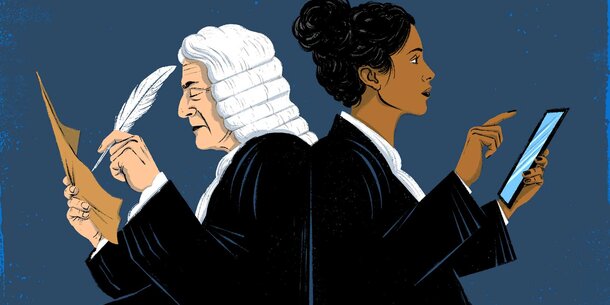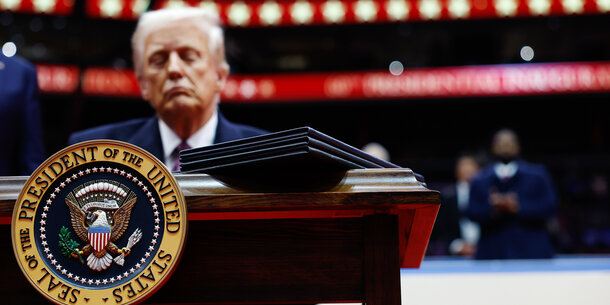For years, historians have been filing friend-of-the-court briefs in high-stakes cases before the Supreme Court. Their filings appear in cases that have had — or are poised to have — profound impacts on American law, dealing with issues ranging from partisan gerrymandering to gun control to affirmative action.
Moore v. Harper (October Term 2022)
The Supreme Court received multiple filings from historians in Moore v. Harper — a case in which the justices are considering whether to endorse the “independent state legislature theory” — a novel, fringe interpretation of the U.S. Constitution’s Elections Clause that would free state legislatures from the traditional checks and balances on their ability to make laws for federal elections.
Ten leading scholars of early American history filed a brief demonstrating that the theory is implausible as a historical matter. Their brief explained that there is no evidence that anyone at the time of the Constitution’s framing believed in the theory, nor is it plausible that the framers would have endorsed it had it been presented to them. The historians emphasized that the framers were wary of unchecked power and created the Elections Clause to limit out-of-control state legislatures.
The dean of Georgetown Law, who is a leading scholar on the history of judicial review, also opposed the independent state legislature theory. His brief explained that judicial review was well established by the time of the founding and was implicit in the framers’ ideas of constitutionalism. As a consequence, the brief stressed, the Elections Clause permits state courts to review the laws their legislatures make for federal elections.
Students for Fair Admissions v. President and Fellows of Harvard College (October Term 2022)
Nineteen historians and law professors specializing in 19th-century U.S. history filed a brief in Students for Fair Admissions v. President and Fellows of Harvard College, a challenge to affirmative action programs in higher-education admissions. Their brief — which defended affirmative action — explained that the 14th Amendment’s framers designed the amendment to further racial equality and embraced a variety of race-conscious efforts to advance equality. As a result, the brief emphasized, the 14th Amendment would not prohibit race-conscious admissions policies.
Arizona v. Navajo Nation (October Term —2022)
Five scholars who specialize in the history of relations between Native American nations and the United States filed a brief in Arizona v. Navajo Nation, a case asking whether the federal government’s failure to assert water rights for the Navajo tribe from the Colorado River violates the government’s legal duties to the tribe. The brief described how Congress and the executive branch have bound themselves since the founding to protect and care for Native American nations, including by ensuring they have adequate water for their homelands. It also explained that Congress has tasked the judiciary with holding the executive branch accountable through lawsuits.
Merrill v. Milligan (October Term 2022)
Ten historians and scholars of Alabama state history filed a brief in Merrill v. Milligan, an appeal arising from a Voting Rights Act lawsuit that seeks to invalidate Alabama’s congressional map for diluting the voting power of Black communities. The historians’ brief attempted to show that Alabama’s Black Belt is a “community of interest” that should be respected when the state’s electoral districts are drawn. As the historians illustrated, residents of the Black Belt have a shared history going back two centuries. The brief documented the region’s roots in slavery and described the economic hardship, exclusion from social services including education and healthcare, and other myriad forms of discrimination that Alabama Black Belt residents have historically faced.
New York State Rifle & Pistol Association v. Bruen (October Term 2021)
Seventeen scholars specializing in the history of firearms regulation provided historical context in New York State Rifle & Pistol Association v. Bruen, a case in which the Supreme Court struck down a New York state gun control law limiting concealed carrying of weapons. Their brief filed in support of the New York law highlighted centuries of laws — from 14th-century England through the 20th century — seeking to preserve public order and peace by restricting the individual right to publicly carry weapons.
Dobbs v. Jackson Women’s Health Organization (October Term 2021)
The American Historical Association and the Organization of American Historians jointly submitted a brief in Dobbs v. Jackson Women’s Health Organization, the case in which the Supreme Court overturned Roe v. Wade and held that the 14th Amendment does not protect the right to abortion. Their brief in support of abortion providers described the history of abortion regulations from English common law through the end of the 19th century. The AHA and OAH explained that English common law, which did not recognize or regulate abortion until “quickening” (when a pregnant woman first feels fetal movement), influenced state laws prior to the ratification of the 14th Amendment in 1868. At that time, the historians showed, nearly half of the states allowed pre-quickening abortions or imposed lighter punishments for them.
Fulton v. City of Philadelphia (October Term 2020)
Seven historians of child welfare filed a brief in Fulton v. City of Philadelphia, a case in which the Supreme Court held that Philadelphia’s policy of requiring foster care agencies to certify that they would not discriminate against same-sex couples violated the agencies’ rights under the Free Exercise Clause of the First Amendment. Challengers of that policy claimed that the state historically did not regulate activity related to child welfare. The historians’ brief — which they filed in support of Philadelphia’s policy — countered that notion, explaining that governments have done so since the country’s founding. Among other things, the brief described how in the past 100 years, the government grew substantially more involved in funding and regulating foster care. It explained that the government developed standards and systems of licensure not only to ensure the adequate protection of minor children but also to guard against discrimination by private actors in the foster care system, which Philadelphia’s policy is aimed at preventing.
R.G. & G.R. Harris Funeral Homes v. EEOC (October Term 2019)
Nine historians focused on the history of gender, sexuality, and law in the United States filed a brief in R.G. & G.R. Harris Funeral Homes v. EEOC, the case in which the Supreme Court held that the federal Civil Rights Act’s prohibition on sex discrimination applies to discrimination against LGBTQ+ individuals. Their brief described how historical evidence from the first decade after Title VII’s enactment illustrates that the public understanding of the word “sex” and of “discrimination because of . . . sex” were then, as they are now, sufficiently broad and multidimensional to include discrimination against lesbian, gay, bisexual, and transgender individuals.
Department of Commerce v. New York (October Term 2018)
In 2019, six historians and social scientists filed an amicus brief in Department of Commerce v. New York, a case in which the Supreme Court blocked the Commerce Department’s 2018 decision to add a citizenship question to the 2020 census. Their brief challenged the Commerce Department’s claim that its decision was merely a “reinstatement” of a question “whose pedigree dates back nearly 200 years.” The brief explained that the census has never asked for the citizenship status of everyone in the country, and, more importantly, the census has changed in material ways that limit the usefulness of older censuses as models for contemporary censuses.
Rucho v. Common Cause (October Term 2018) & Gill v. Whitford (October Term 2017)
In a series of cases considering the constitutionality of partisan gerrymandering, Rucho v. Common Cause and Gill v. Whitford, 16 historical scholars filed briefs explaining that partisan gerrymandering has been denounced throughout American history as an unconstitutional abuse of power. As their briefs showed, the practice of drawing maps to entrench one political party runs counter to the vision of “actual representation” that was fundamental to the framers’ vision for American constitutional democracy. Their briefs also explained how partisan gerrymandering is hostile to values reflected in the First Amendment, the 14th Amendment, and Article I of the Constitution. The briefs distinguished contemporary “extreme” gerrymanders, with their threat of persistent entrenchment, from less severe or less effective historical gerrymandering practices.
Arizona State Legislature v. Arizona Independent Redistricting Commission (October Term 2014)
In Arizona State Legislature v. Arizona Independent Redistricting Commission, a case in which the Supreme Court upheld the constitutionality of Arizona’s independent redistricting commission, five historians with expertise from the colonial era to the early decades of the federal republic filed a brief supporting the commission. Their brief explained, among other things, that the ballot initiative process that Arizona voters used to create the commission was consistent with founding-era ideas of popular sovereignty and the legislative power of the people as distinct from their legislators.



